
In the waning months of World War II, scientists worked feverishly to finish first in the so-called “race to build the bomb.” Would it be the Allies or the Nazis? Humanity’s future depended on the Allies winning that race. Thankfully, they did.
Harnessing atomic power remains one of the single greatest accomplishments in human scientific history, just as the sheer magnitude of destruction delivered by the two atom bombs dropped on Nagasaki and Hiroshima remains the single most horrific military operation ever. Thankfully, it has yet to be repeated.
The ethical rationale for developing and dropping these bombs was avoiding even greater losses of human life and property should the Allies need to conduct a major assault and full invasion of mainland Japan. However, the ramifications of that fateful discovery saw two generations of the world’s opposing superpowers locked in an arms race, and the entire world’s eyes locked on a doomsday clock.
More than 70 years later, questionable nuclear deals with Iran and rising tensions between the United States and the former Soviet Union are only the latest reminders that the threat of nuclear self-destruction remains just as real in the 21st century as it was in the 20th, even if it is now silent as a sleeping giant. Nuclear bombs are not the only self-destructive dangers this century shares with the last. Eugenics was the name then. Today, with highly refined and advanced techniques, the preferred euphemism is “human genome editing.”
In this field, yet another race in scientific discovery was apparently won recently. This one might be called “the race to build a better baby.” The Washington Post reports that “He Jiankui, the Chinese researcher who claimed this week to have helped produce the world’s first genetically altered babies…defended [the] procedure that has shaken the scientific world.”
DNA editing, as with the atomic bomb, originated in noble intentions and purpose. The Post says the goal was “’to make [embryos] resistant to HIV infection,’ [about which] the Stanford-trained bioengineering professor said he felt ‘proud’ of his work and its implications for public health in the face of nearly universal condemnation.” Others were quick to refute this as a legitimate reason to take such unethical and uncertain risks on living human beings, citing “the fact that the procedure was not medically necessary as there are other treatments for HIV.”
This research was swiftly and loudly protested within and without the world’s scientific community. The same Washington Post article further reports, “Nobel laureate David Baltimore said the study resulting in the birth of two girls showed ‘there has been a failure of self-regulation in the scientific community.’”
The Associated Press reports that, after the public condemnation, “China’s government ordered a halt Thursday to work by [He’s] medical team” and that “Chinese Vice Minister of Science and Technology Xu Nanping told state broadcaster CCTV that his ministry is strongly opposed to [He’s] efforts…[and] Xu called the team’s actions illegal and unacceptable and said an investigation had been ordered.”
Building a bomb with unimaginable destructive capabilities, then actually using it, was widely renounced in 1945. That opposition has remained ever since, with the 20-20 hindsight that only lived experience can give of what then were yet only inconceivable uncertainties of the implications to follow.
Although He’s field of research shares the same serious moral and ethical implications arising from the certain destruction of multiple living human embryos that routinely occurs whenever they are mass produced in the laboratory for scientific research, it seems what most concerns ethicists regarding human genome editing is the uncertainty of outcome, rather than the existing certainty of many human embryos being altered and killed in the process.
A statement prepared by the Organizing Committee of the Second International Summit on Human Genome Editing, at whose conference He chose to make his announcement, includes the following conclusion: “Germline editing could produce unintended harmful effects for not just an individual but also for that individual’s descendants. Changes to a particular trait may have unanticipated effects on other traits that could vary from person to person and in response to environmental influences.”
Whether it will take 70 years and 20-20 hindsight to properly judge the implications of He’s alleged discovery on human history is not yet known. For now, the chances of a population explosion of designer babies hitting the planet in the magnitude anywhere near that of a nuclear bomb seems unlikely anytime soon. Based on the widespread condemnation and calls for significant increases in regulation, any race among nations to dominate and capitalize on this so-called advancement should be slow coming out of the gate.
Yet, just as the moral of the scene at the close of the 1993 blockbuster movie “Jurassic Park” shows us, sometimes it only takes one Jurassic Jerk and a shaving cream can to change the course of human history—or to end it. Ultimately, He’s unsubstantiated claims may turn out to be just another science fiction. Any sequel to what has been characterized as “a byproduct of personal ambition“ has yet to be written.
But perhaps William Hurlbut, a bioethicist at Stanford University who knows He and was familiar with his research aspirations, summarizes best the uncertainty of what comes next, “Now the door is open to this and will never close again. It’s like a hinge of history.”








